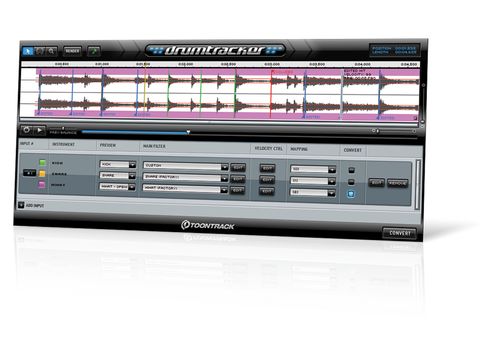Drumtracker is a standalone drum replacer that uses audio drum files (WAV or AIFF) to generate MIDI for drum sound replacing and/or editing purposes in your DAW.
It can work with single-drum source material (ie, multitrack recordings) and, unlike other drum replacing software, full drum mixes. It looks neat and appears pretty straightforward, so let's find out how it performs in the real world…
In detail
To get started, you import the audio source material and, using Drumtracker's input section, specify as many drums as you want to generate MIDI information for - in our first test project, we added kick, snare and hi-hat.
You can manually map each instrument to a different MIDI note to suit the setup in your drum sampler/DAW, or select from ready-mapped templates. The source material then appears in the main window and you can get cracking.
If you're working with single mic'ed drums on separate audio tracks, simply select the sections you want to create MIDI from with the part tool. For processing mixed material, you have two options: either process and save out MIDI for each kit piece one at a time, or process the lot using multiple selections.
To do this, you have to manually select every single drum hit with its respective filter (ie, all the kicks, then all the snares...), which takes absolutely ages for a complex performance.
However, the selection envelopes can't overlap, and since you can only manually add notes inside an existing envelope, if you have, say, a kick and hi-hat played at the same time, you're stuffed. Ultimately, you could give this mode a miss and process each kit piece separately by loading the same file into multiple tracks.
Hit play and the audio is previewed, adding trigger events on the fly, which show up on the main display in green. You can fine-tune the creation of events by adjusting the main filter for each instrument, which has basic controls and a few presets, not to mention determining velocity when hits are transformed into MIDI.
There's no audition option for the filter, but Toontrack says this is deliberate, as the transient information of the drum (which the triggering interprets) is often in a different frequency range to its 'tone' and could be misleading.
To check that the triggering is accurate, the preview Balance control blends between the source material and built-in samples activated by the trigger events. If necessary, these last can be manually added, moved and deleted.
Summary
Drumtracker is a mixed bag. Although it handles single-drum source material reasonably well, the filter section isn't anywhere near as easy to use or comprehensive as we'd like - we'd really like to see more extensive frequency controls.
Drumtracker copes with simple beats well enough, but we had trouble getting accurate triggering from rapid snare material. And for rolls or drills of any kind, we had to spend time manually configuring a separate threshold for each such occurrence.
No drum triggering method is perfect, of course, but software rival Drumagog handles fast playing better, and the famous ddrum hardware system outperforms any software we've tried. This will be a particular concern for those hoping to use Drumtracker for metal productions, where speedy playing and triggered drum sounds are commonplace.
For reasonable audio-to-MIDI functionality with some extra editing functions, you could do worse than Drumtracker, though some producers may find it to be lacking.


